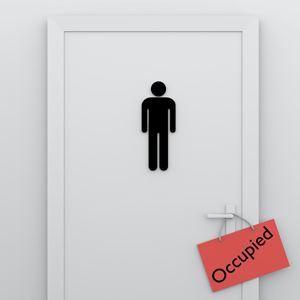Lawyer's bathroom break didn’t justify removal of case from jury docket, appeals court rules

Image from Shutterstock.com.
A lawyer’s bathroom break and a client’s late appearance didn’t justify a judge’s decision to remove a case from the jury docket, a Texas appeals court has ruled.
In a Sept. 19 opinion, the Texas Fourteenth Court of Appeals ordered the trial judge to reinstate the case on the jury docket, Law360 reports.
The judge had moved the case to the nonjury docket in August of last year when neither the lawyer nor the client was present the second time a pretrial hearing was called.
The lawyer, associate Chris Ainsworth of the Poerschke Law Firm in Houston, answered the docket call at 9 a.m., then left at about 9:25 a.m. to go to a different court in the building, according to the opinion and Ainsworth’s affidavit.
Ainsworth returned to the courtroom at about 9:35 a.m. and was told by the court coordinator that the case had just been called.
Ainsworth informed the court coordinator that he had to use the restroom, and she told him to hurry back.
The case was called again at 9:39 a.m. Ainsworth returned to the courtroom at about 9:50 a.m., and his client arrived at about 9:55 a.m.
Ainsworth filed a motion for reconsideration and requested a hearing. He called the court three times to schedule a hearing but was unable to leave a message because the mailbox was full. He also emailed the court coordinator twice but received no response.
The appeals court said the judge’s removal of the case from the jury docket was an abuse of discretion. The court cited several reasons for its decision. They included:
• Texas civil procedure rules allow dismissal of a case for want of prosecution when a party fails to appear, but they do now authorize removal of a case from the jury docket.
• There was no relationship between the courtroom tardiness and withdrawal of the case from the jury docket.
• The lawyer’s brief absence from the courtroom did not justify a sanction imposed on the client.
• The opposing side was not harmed, “particularly as the lawyer had been absent for only four minutes when the judge called the case.”
• The sanction was excessive.
The court ruled in a custody dispute between the father of two children and the children’s maternal grandmother.
Ainsworth commented in an email to the ABA Journal.
“After losing her daughter to cancer, my client is defending her rights to visitation with her grandchildren,” Ainsworth said. “I agree with the Court of Appeals that depriving my client of one of our most precious rights, trial by jury, was excessive. And I must give credit to Scott Poerschke for his excellent work on the mandamus petition.
“That said, I could have died of embarrassment reading the opinion. But I cannot afford to dwell on it. Instead, I will take advice given by my late grandmother: ‘Pick up the pieces, and move on.’ “



